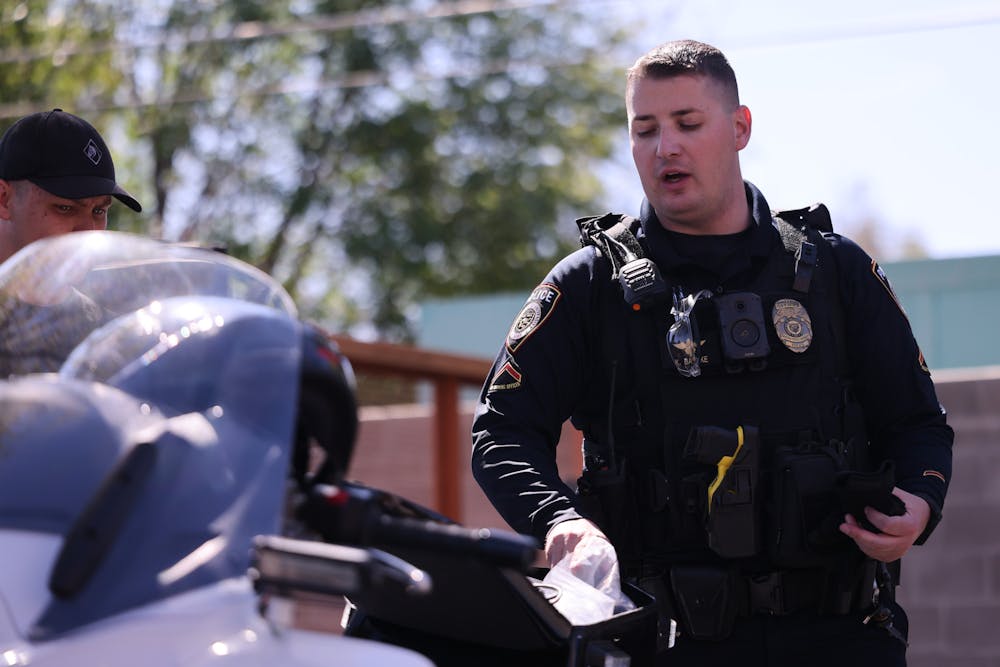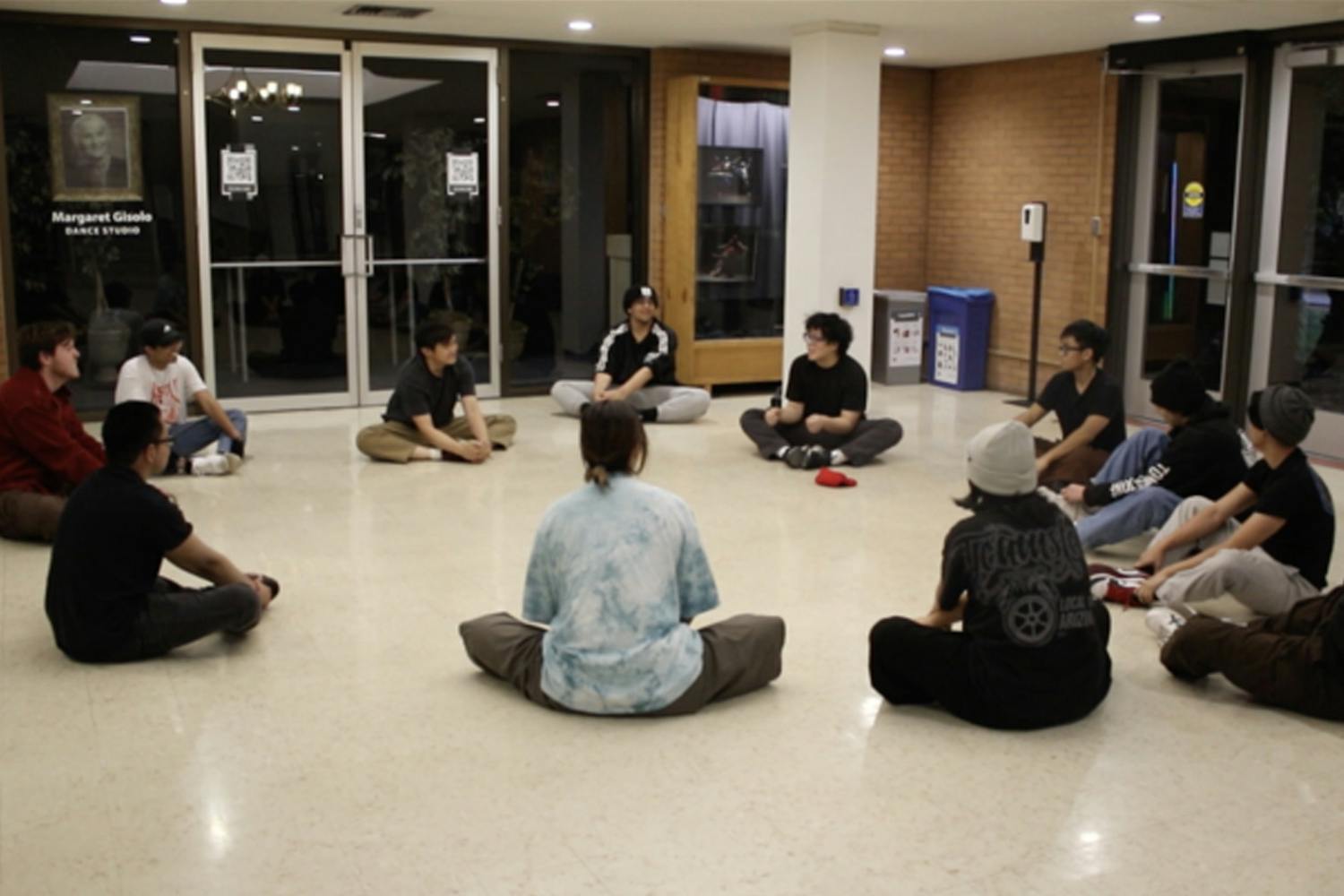The ASU Police Department has served students for 77 years. Established by the Arizona Board of Regents, ASU PD began as the Arizona State College Patrolmen in 1948 when there were just over 10,000 people on campus.
Today, there are about 95 sworn officers, about 80 professionals and 45 student workers, said Assistant Chief of Police Carrie Gambee.
This is the second time in 28 years that all the lines at ASU PD are full, said Jennifer Bryner, a police lieutenant who oversees the Professional Services Bureau and police commander Daniel Macias.
Police officers from all over the country come to work for ASU PD, from Long Island to Chicago and Green Bay to San Francisco.
ASU PD currently has four canines that are trained in explosive detection to ensure event safety on campus.
Depending on the size of an event all four EDDs could be out working. Typically that means they survey the area, nearby cars and more, Bryner said.
The department has specialized units for different cases. There is a Criminal Investigations Bureau, which also has the Special Victims Unit, which specializes in sex and child crimes. Bryner said ASU PD also often works in collaboration with other law enforcement agencies.
The Special Operations Unit manages high liability cases using similar training to what SWAT would normally use, said Macias, who has served ASU PD for 28 years. There is also an event planning unit to coordinate times and shifts with ASU stakeholders.
In February, there were 92 events on the Tempe campus requiring ASU PD. With officer availability, it is difficult to staff both events, everyday patrols and investigation duties and investigation duties, which is why officers from cities like Tempe, Mesa or Gilbert often assist ASU PD, said Macias.
"By the sheer number, we have to rely on other departments to do it," Macias said.
Jason Weber is the crime prevention programs manager across ASU campuses and ASU centers outside of the Valley, from Washington, D.C., to Los Angeles.
Weber said the No.1 problem ASU PD faces on the Tempe campus is the theft of scooters and bikes. The department has begun implementing new strategies to combat the high level of theft — like leaving bait scooters with GPS to catch frequent thieves on campus. The department is also attempting to place racks in open spaces, like the Memorial Union, where more people have eyes on them, Weber said.
ASU PD also sends officers to monitor these racks and educate students on registering their property. Having a bike or scooter’s serial number registered is the only way to get students' property back, Macias said.
With high traffic on the Tempe campus, Weber advises students to use U-locks instead of cable locks, which are easily broken by bolt cutters.
Weber said ASU PD is different from city police because they try to be education-based. Although they are sworn officers capable of making arrests, they also have the ability to report potential crimes through a referral process to the dean of students who enforces the Student Code of Conduct. Officers have the option to provide educational opportunities to students accused of breaking campus rules.
Weber said former Chief of Police Michael Thompson, who retired last year, would say, "We want our students to leave here with a degree and not a record."
READ MORE: ASU Police Department chief placed on leave due to actions during pro-Palestine encampment
Officers understand that college years are a formative time, Weber said.
"This is a great time in college to meet people and do some different experiences," Weber said. "We're here just to make sure you get through that."
A common thing ASU PD handles is cases regarding alcohol or marijuana. ASU PD can allow students to take a diversion course to learn about the dangers of over-intoxication, how much alcohol is in different drinks and other prevention information.
Once students successfully complete the class, the ticket is gone and "hopefully, they learn something," Weber said. There is also a pedestrian, bike and scooter diversion class among other resources for students to learn about their personal safety.
ASU PD hosts citizen academies at least twice a year to build relationships with the campus community, Weber said.
The program is an all day activity where attendees can learn about what ASU PD does and how it operates. Attendees get hands on experience in traffic stops, finding fingerprints and a canine demonstration.
The free program also allows attendees to experience a variety of real world scenarios through a virtual reality training tool.
ASU's ranking as No.1 in innovation extends beyond academics and goes all around the school, Weber said. ASU PD is recognized as a model for university policing, with other colleges looking to them for guidance, Macias said.
At a past meeting with other Big 12 schools, Kansas State sought advice on ways to improve its camera surveillance, highlighting ASU PD's role as a leader in campus safety. Weber said members of the conference meet monthly to share strategies and best practices.
Weber said it is important for students to build positive relationships with ASU PD now as this can shape their perceptions of law enforcement beyond college.
Editor's note: This story was updated on March 27 at 11:12 p.m. to clarify some of the statements from the ASU police officers.
Edited by Alysa Horton, Sophia Ramirez, Alexis Heichman and Katrina Michalak.
Reach the reporter at nrodri74@asu.edu.
Like The State Press on Facebook and follow @statepress on X.
Natalia is a sophomore studying journalism and mass communication with a minor in creative writing. This is her second semester at The State Press.




